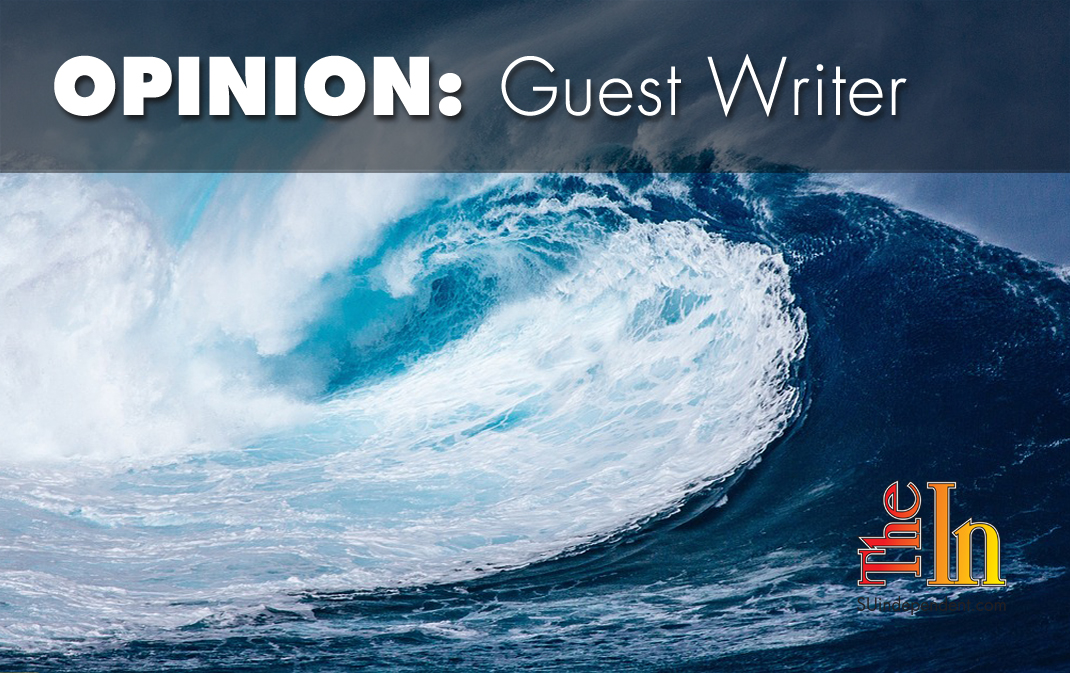
Not only is a blue wave coming, it’s getting stronger
By Carl Golden
As the Trump White House lurches from one public relations disaster to another, Democrats are increasingly optimistic over regaining control of the House in an overwhelming fashion. Some are giddily predicting a landslide of upwards of 60 seats — nearly three times the number it needs to assume the majority.
Buoyed by an advantage of 14 points in the generic Republican versus Democrat polling — the gap was a narrow two points a month ago — the party is again talking confidently of a blue wave in November and a resounding rebuke of a president whose job performance rating has fallen to 40 percent.
Republicans had counted heavily on the nation’s economic resurgence to carry it to another term in the majority, but a recent poll revealed that only 12 percent of Americans identified the economy as the most important issue facing the nation while 29 percent named government leadership (read: Trump and the Republican Congress).
The election for the House is still 435 individual contests, but it’s become a nationalized referendum on the president, fulfilling the Democrats’ fondest hope. Democrats have raised more money than Republicans nationally, and seats that have been GOP property for years are suddenly competitive, if not dicey.
Democratic voters are considerably more motivated and enthusiastic, driven by an intense dislike for the president and a visceral desire to demonstrate that the country committed a serious mistake in 2016 by choosing Trump over Hillary Clinton.
Republican congressional candidates — incumbents and challengers alike — face the brunt of this thirst for revenge. Payback is a … well, you know what.
Trump cannot escape the lion’s share of responsibility for the decline in party stature and for the bleak outlook in the midterm election. He’s never been shy about speaking his mind, even when his musings create political headaches for party leaders and candidates alike.
What was once considered to be a refreshing attribute — smashing all the politically correct china — has become a serious drag as candidates struggle to distance themselves from Trump’s more outrageous and demonstrably false comments without alienating the hardcore party base.
The president is clearly convinced that he is his own best media consultant and neither requires nor desires advice from others — advice and counsel that could help him avoid the frequent uproars which dominate the news cycle for days or weeks on end with absolutely no benefit to be gained.
Rather than taking every opportunity to promote a solid record of producing an economic powerhouse, Trump has drifted well off message by responding to every real or imagined slight as if the very future of the Republic was at stake.
Most recently, he’s spent enormous amounts of time attacking a new book by Washington Post editor Bob Woodward, which portrays an administration in such dangerous disarray that there is open talk of relieving Trump of office.
He followed by engaging in a monumentally stupid argument over the number of fatalities attributed to Hurricane Maria, when the storm devastated Puerto Rico last year. It was an epic blunder embarrassing party leadership, dealing a potentially mortal blow to the Senate candidacy of Gov. Rick Scott in Florida, and sending others scurrying to distance themselves from his remarks.
He seems to have forgotten that he’s no longer sitting behind a desk in Trump Tower barking orders at subordinates while delivering verbal broadsides against competitors, the news media, or anyone he believes has crossed him in some fashion or another.
Rather than a smooth transition from New York real estate mogul to the leader of the Free World and the Republican Party, Trump has overlaid all his management practices from the private sector onto the public sector. He’s weighed down by his grudges, temperament, and personal biases and is ill-served by a sycophantic coterie playing to his worst instincts.
The blue wave, once thought to be ebbing significantly, has gathered strength and, in some seven weeks, will either come crashing ashore or deposit a small puddle on the sand.
At this moment, the crash is more likely.
Carl Golden is a senior contributing analyst with the William J. Hughes Center for Public Policy at Stockton University in New Jersey.
The viewpoints expressed above are those of the author and do not necessarily reflect those of The Independent.
How to submit an article, guest opinion piece, or letter to the editor to The Independent
Do you have something to say? Want your voice to be heard by thousands of readers? Send The Independent your letter to the editor or guest opinion piece. All submissions will be considered for publication by our editorial staff. If your letter or editorial is accepted, it will run on suindependent.com, and we’ll promote it through all of our social media channels. We may even decide to include it in our monthly print edition. Just follow our simple submission guidelines and make your voice heard:
—Submissions should be between 300 and 1,500 words.
—Submissions must be sent to editor@infowest.com as a .doc, .docx, .txt, or .rtf file.
—The subject line of the email containing your submission should read “Letter to the editor.”
—Attach your name to both the email and the document file (we don’t run anonymous letters).
—If you have a photo or image you’d like us to use and it’s in .jpg format, at least 1200 X 754 pixels large, and your intellectual property (you own the copyright), feel free to attach it as well, though we reserve the right to choose a different image.
—If you are on Twitter and would like a shout-out when your piece or letter is published, include that in your correspondence and we’ll give you a mention at the time of publication.



